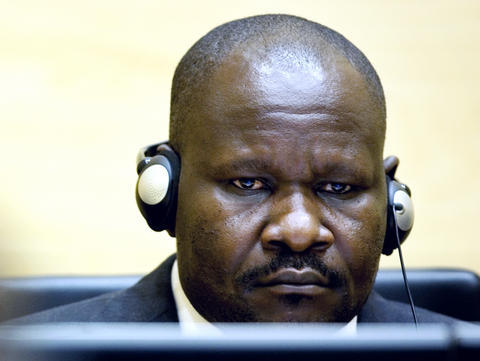A Congolese militia leader made his first appearance on Monday before the International Criminal Court, arguing he already had been acquitted of charges linked to the 2003 destruction of a village and the deaths of 200 villagers.
Mathieu Ngudjolo was arrested last week in Kinshasa and turned over to the Hague-based court. The 37-year-old is the third Congolese suspect taken into custody by the world's first permanent war crimes court.
Ngudjolo allegedly led forces of the National Integrationist Front -- including child soldiers -- who attacked the village of Bogoro in the eastern Ituri region of Congo in 2003, the court said.

PHOTO: AP
The rebel fighters murdered 200 people, captured women and girls as sex slaves and locked prisoners in a room full of corpses, prosecutors allege. Ngudjolo faces three charges of crimes against humanity and six of war crimes.
Belgian defense attorney Jean-Pierre Kilenda told the judges the case was inadmissible because Ngudjolo had been tried for the same offenses by a Congolese court and acquitted in June 2004.
"He cannot be tried twice for the same crimes," Kilenda said. "There is nothing left for you but to acknowledge the fact that this case is inadmissible."
Kilenda also said that, should the court decide to continue with the case, it should release Ngudjolo pending his trial, for which no date has been set.
Prosecutors said they would respond to the court in writing, and judges did not comment on Kilenda's claims.
"Obviously, we will be opposing both applications -- admissibility as well as provisional release," deputy prosecutor Fatou Bensouda said.
Ngudjolo is the second suspect arrested in connection with the Bogoro attack. Last year, Congolese authorities handed over Germain Katanga, known as Simba, who is accused of leading the Patriotic Resistance force when it attacked Bogoro.
He has not yet entered a plea.
At a closed-door hearing that was scheduled to take place after press time yesterday, prosecutors were to seek to have the two suspects tried together.
Back-to-back wars in Congo from 1998 to 2002 drew in armies from half a dozen neighboring countries.
Sporadic fighting continues in the country's eastern border region, which is divided into zones controlled by rival factions.
At the time of his arrest, Ngudjolo was a colonel in the Congolese national army. Congolese President Joseph Kabila entered a power sharing deal with militia leaders to end the country's civil war and co-opted some of them into the national army.
Asked by the three-judge panel about his conditions of detention, Ngudjolo said he had no complaints, apart from the quality of the Dutch cooking he is served at the court's detention center.
"It doesn't agree with me," Ngudjolo said.

DOUBLE-MURDER CASE: The officer told the dispatcher he would check the locations of the callers, but instead headed to a pizzeria, remaining there for about an hour A New Jersey officer has been charged with misconduct after prosecutors said he did not quickly respond to and properly investigate reports of a shooting that turned out to be a double murder, instead allegedly stopping at an ATM and pizzeria. Franklin Township Police Sergeant Kevin Bollaro was the on-duty officer on the evening of Aug. 1, when police received 911 calls reporting gunshots and screaming in Pittstown, about 96km from Manhattan in central New Jersey, Hunterdon County Prosecutor Renee Robeson’s office said. However, rather than responding immediately, prosecutors said GPS data and surveillance video showed Bollaro drove about 3km

Tens of thousands of people on Saturday took to the streets of Spain’s eastern city of Valencia to mark the first anniversary of floods that killed 229 people and to denounce the handling of the disaster. Demonstrators, many carrying photos of the victims, called on regional government head Carlos Mazon to resign over what they said was the slow response to one of Europe’s deadliest natural disasters in decades. “People are still really angry,” said Rosa Cerros, a 42-year-old government worker who took part with her husband and two young daughters. “Why weren’t people evacuated? Its incomprehensible,” she said. Mazon’s

‘MOTHER’ OF THAILAND: In her glamorous heyday in the 1960s, former Thai queen Sirikit mingled with US presidents and superstars such as Elvis Presley The year-long funeral ceremony of former Thai queen Sirikit started yesterday, with grieving royalists set to salute the procession bringing her body to lie in state at Bangkok’s Grand Palace. Members of the royal family are venerated in Thailand, treated by many as semi-divine figures, and lavished with glowing media coverage and gold-adorned portraits hanging in public spaces and private homes nationwide. Sirikit, the mother of Thai King Vajiralongkorn and widow of the nation’s longest-reigning monarch, died late on Friday at the age of 93. Black-and-white tributes to the royal matriarch are being beamed onto towering digital advertizing billboards, on

POWER ABUSE WORRY: Some people warned that the broad language of the treaty could lead to overreach by authorities and enable the repression of government critics Countries signed their first UN treaty targeting cybercrime in Hanoi yesterday, despite opposition from an unlikely band of tech companies and rights groups warning of expanded state surveillance. The new global legal framework aims to bolster international cooperation to fight digital crimes, from child pornography to transnational cyberscams and money laundering. More than 60 countries signed the declaration, which means it would go into force once ratified by those states. UN Secretary-General Antonio Guterres described the signing as an “important milestone,” and that it was “only the beginning.” “Every day, sophisticated scams destroy families, steal migrants and drain billions of dollars from our economy...